Fathers of the Church: St. Cyril of Alexandria (7 vols.)
Digital Logos Edition
Overview
St. Cyril served as Bishop of Alexandria in the fifth century. This collection contains prominent examples of his well-researched biblical exegesis, instructions for his diocese in celebrating important events in the Church year, and important correspondence that provides readers with insight into his attuned theological mind. Known for his opposition to the Nestorian heresy, Cyril stands as a prominent example of a Church Father who championed orthodoxy while still shepherding those entrusted to him.
Key Features
- Contains relevant and insightful biblical teaching on Old Testament prophets
- Provides readers with examples of his instruction for early Church festival observance
- Reveals the theological emphases that Cyril included in his occasional writings
Product Details
- Title: Fathers of the Church: St. Cyril of Alexandria
- Author: Cyril of Alexandria
- Series: The Fathers of the Church
- Publisher: Catholic University of America
- Volumes: 7
- Pages: 2,106
- Resource Type: Ancient Texts
- Topic: Church Fathers
This title is included in the following collections
You can save when you purchase this product as part of a collection.
2025 Orthodox Gold
$849.99$679.99Fathers of the Church: Greek F...
$759.99$759.99Logos 8 Orthodox Gold Legacy L...
$849.99$849.99Verbum 8 Eastern Rite Gold Leg...
$849.99$849.99
- $849.99
- $849.99
- $849.99
- $849.99
- $1,499.99$1,049.99
- $1,499.99$1,199.99
- $1,499.99
- $1,499.99
- $1,499.99
- $2,249.99$1,799.99
- $2,999.99$2,099.99
- $2,999.99$2,249.99
- $2,499.99
- $2,999.99
- $2,999.99
- $2,999.99
- $2,999.99
- $2,999.99
- $4,749.99$3,324.99
- $3,434.99
- $4,749.99$3,562.49
- $4,749.99$3,562.49
- $4,749.99$3,562.49
- $3,730.99
- $3,999.99
- $4,749.99
- $4,749.99
- $4,749.99
- $4,749.99
- $4,749.99
- $4,749.99
- $4,749.99
- $4,749.99
- $6,399.99$5,439.99
- $5,999.99
- $5,999.99
- $7,749.99
- $7,749.99
- $10,999.99$8,249.99
- $11,377.57$8,499.99
- $12,989.68$10,391.74
- $11,399.99
- $11,399.99
- $11,399.99
- $23,999.99$17,999.99
- $21,749.99
- $24,999.99
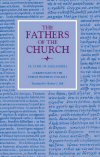
Commentary on the Twelve Prophets, vol. 1
- Author: Cyril of Alexandria
- Translator: Robert C. Hill
- Series: Fathers of the Church
- Publisher: Catholic University of America Press
- Publication Date: 2007
- Pages: 327
Cyril, Bishop of Alexandria (412–444), is best known as a protagonist in the christological controversy of the second quarter of the fifth century. Readers may be surprised therefore to find such polemic absent from this early work on the twelve minor prophets of the Old Testament. Another possibly unexpected feature of this Alexandrian commentary is its focus on historical exegesis, which reveals Cyril’s serious interest in the fortunes of the people of Israel and Judah in the centuries preceding and following the exile. Unlike his predecessor Didymus the Blind, Cyril abjures an approach that dismisses the historicity of the text (as in his opening defense of Hosea’s marriage), and he proceeds to other levels of interpretation, moral and spiritual, only after a preliminary examination of the historical.
Indebted to the diverse approaches of Didymus, Jerome, and Theodore, Cyril appears in this work as a balanced commentator, eclectic in his attitude and tolerant of alternative views. Although he displays an occasional uncertainty in his grasp of historical and geographical details, as well as an inclination to verbosity, Cyril has conspicuously influenced the exegesis of his younger contemporary Theodoret of Cyrus, and has made a vital contribution to the development of biblical interpretation in the church.
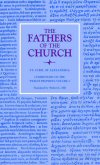
Commentary on the Twelve Prophets, vol. 2
- Author: Cyril of Alexandria
- Translator: Robert C. Hill
- Series: Fathers of the Church
- Publisher: Catholic University of America Press
- Publication Date: 2008
- Pages: 442
Cyril of Alexandria’s contributions to theology are not confined to his prominent role in the fifth-century christological conflict, but are also vital to the development of biblical exegesis. Drawing insights from older contemporaries, Cyril examines in depth the historical contexts of prophetic texts, utilizing his knowledge of events and geographical locations in deriving his interpretations. Imperfect though his knowledge is, his approach is worthy of admiration because it combines historical analysis with moral and spiritual perspectives in achieving a balance that cannot be labeled as either “Alexandrian” or “Antiochene.” This balance is assured by the broad diversity among Cyril’s sources, namely, Didymus the Blind, Jerome, and Theodore of Mopsuestia. Cyril in turn has exerted a direct influence on Theodoret of Cyrus, thus forging a link in the succession of patristic exegetical developments.
For Cyril, as for the Fathers in general, the internal unity of the Bible guarantees that its texts can be applied to the interpretation of other texts within the scriptural canon. A focal point of Cyril’s interpretation is the relationship between God and his people as it unfolds in the course of history, revealing a sovereign God who, while tolerating no infidelity, perseveres patiently in correcting the errant. This relationship is the basis of a motif that unifies the Old and New Testaments, with the prophets serving as precursors of the Savior; thus their proclamations, though often aimed at the events of their own times, speak to believers of all eras.
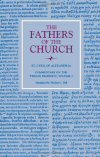
Commentary on the Twelve Prophets, vol. 3
- Author: Cyril of Alexandria
- Translator: Robert C. Hill
- Series: Fathers of the Church
- Publisher: Catholic University of America Press
- Publication Date: 2012
- Pages: 368
This final volume in a series of three contains Cyril’s commentary on Zephaniah, Haggai, Zechariah, and Malachi. Applying his knowledge of ancient Israelite history in his analysis of the immediate context for each of these prophetic books, Cyril believes that Zephaniah was addressed to the residents of Jerusalem in the years preceding the Babylonian Exile, and the other three were addressed to a newly repatriated, post-exilic nation.
An emphasis on theodicy is a primary theme of this book. God’s love for humankind, says Cyril, is expressed in the many warnings sent through the prophets and in the ample amount of time that God allows for people to repent. When no repentance ensues, God sends harsh but just punishments, employing the brutality of enemy nations as his instruments, yet always doing so with the loving purpose of returning his people to himself.
Cyril’s focus on the historical details of the Old Testament is matched by his concern for the Church of his own day. Where the prophetic oracles mention the Jewish priesthood, altar, or sacrifices, Cyril takes the opportunity to exhort Christian priests to preserve their moral purity and to fulfill their liturgical duties with devotion. This extrapolation from the ancient to the contemporary, from Israel to the Church, is compatible with the typological interpretation that Cyril utilizes in conjunction with his literal, historical approach. The Temple is a type, or foreshadowing, of the Church, and the sacrificial lamb of the Passover prefigures Christ. Thus Cyril maintains his connection with the Alexandrian tradition of allegorical exegesis while presenting a balanced, multi-faceted interpretation that applies passages from many other parts of the Bible to extract a wealth of meaning from the prophetic books.
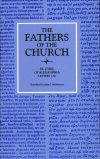
Letters, 1–50
- Author: Cyril of Alexandria
- Translator: John I. McEnerney
- Series: Fathers of the Church
- Publisher: Catholic University of America Press
- Publication Date: 1987
- Pages: 254
Cyril of Alexandria famously took up the debate against Nestorius on the theological interpretation of the deity of Christ, a number of which are addressed in these volumes. This fifth-century Christological controversey comprises most of the teaching of these letters, notably even letters not addressed to Nestorius. The conflict with Nestorius eventually brought Nestorius to condemnation after the Council of Ephesus in 431, in which Cyril presides at the request of Pope Celestine. Almost the entire collection here has to do with the controversey surrounding the Council of Ephesus and the schism of bishops on either side of the theological controversey.
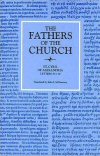
Letters, 51–110
- Author: Cyril of Alexandria
- Translator: John I. McEnerney
- Series: Fathers of the Church
- Publisher: Catholic University of America Press
- Publication Date: 1987
- Pages: 215
Cyril of Alexandria famously took up the debate against Nestorius on the theological interpretation of the deity of Christ, a number of which are addressed in these volumes. This fifth-century Christological controversey comprises most of the teaching of these letters, notably even letters not addressed to Nestorius. The conflict with Nestorius eventually brought Nestorius to condemnation after the Council of Ephesus in 431, in which Cyril presides at the request of Pope Celestine. Almost the entire collection here has to do with the controversey surrounding the Council of Ephesus and the schism of bishops on either side of the theological controversey.
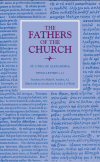
Festal Letters, 1–12
- Author: Cyril of Alexandria
- Translator: Philip R. Amidon
- Series: Fathers of the Church
- Publisher: Catholic University of America Press
- Publication Date: 2009
- Pages: 260
St. Cyril of Alexandria is best known for his role in the Christological disputes of the fifth century. In recent years, however, scholars have turned their attention to Cyril the exegete. Cyril wrote extensive commentaries on nearly every book of the Bible; in fact, two-thirds of his extant corpus is devoted to biblical interpretation. Yet, despite this strong interest in Cyril as theologian and biblical interpreter, his activity as the Patriarch of Alexandria remains obscure. Doctrinal treatises and biblical commentary reveal little of the daily pastoral duties that occupied Cyril during his years as leader of one of ancient Christianity’s most important sees. This new translation of Cyril’s festal letters will help fill these gaps.
Twenty-nine in all, these letters cover all but three of Cyril’s years as bishop. In Alexandria, festal letters functioned primarily as a vehicle for announcing the beginning of Lent and the proper date for the celebration of Easter. They also served an important catechetical purpose by providing the patriarch with an annual opportunity to present his flock with a pastoral version of the theological issues that found more formal and complex expression elsewhere. Thus, Cyril’s Festal Letters offer the modern reader a glimpse into the issues that Cyril himself considered important enough to proclaim to the entire diocese and a sample of how he prepared these ideas for reception by a less sophisticated audience.
These letters illuminate other aspects of the ancient church in Alexandria, including that church’s complex relationship with the Jews and other religious groups, as well as the ways in which the ascetical movement wound its way into the patriarch’s pastoral program. In short, Cyril of Alexandria’s Festal Letters provides modern readers with a rare opportunity to enter the daily reality of the church in ancient Alexandria.
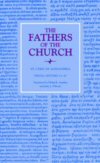
Festal Letters, 13–30
- Author: Cyril of Alexandria
- Series: Fathers of the Church
- Publisher: Catholic University of America Press
- Publication Date: 2013
- Pages: 240
St. Cyril of Alexandria is best known for his role in the Christological controversies of the fifth century. In recent decades, scholars have been attending more carefully to his exegetical legacy. Most of Cyril’s work takes the form of biblical commentary rather than doctrinal treatise. Indeed, during his long career he wrote commentaries on nearly every book of the Bible. Less attention, however, has been given to Cyril’s pastoral work as the Patriarch of Alexandria, perhaps because his commentaries and doctrinal treatises do not reveal much about his daily pastoral duties. Here the Festal Letters are especially helpful.
Twenty-nine in all, these letters cover all but three of Cyril’s years as a bishop. The present volume completes the set. Festal letters were used in Alexandria primarily to announce the beginning of Lent and the date of Easter. They also served a catechetical purpose, however, allowing the Patriarch an annual opportunity to write pastorally not just about issues facing the entire see, but also about the theological issues of the day. Thus, in these letters we catch a glimpse of Cyril the pastor writing about complex theology in an uncomplicated way. These letters also illuminate other realities of the ancient church in Alexandria, especially the relationship with the Jewish community and the rising influence of asceticism.
About Cyril of Alexandria
Cyril of Alexandria was the Patriarch of Alexandria from 412 to 444. His uncle, Pope Theophilus of Alexandria, was Patriarch of Alexandria from 385 to 412. Cyril was well educated, wrote extensively, and was a leading figure in the First Council of Ephesus in 431, the third ecumenical council of the early Christian Church. The council convened amid disputes over the teachings of Nestorius, Patriarch of Constantinople, and Cyril led the charges of heresy against Nestorius. Nestorius’ teachings were condemned by the council, leading to the formation of separate denominations that broke from the Orthodox church.
Cyril of Alexandria is venerated as a saint in the Roman Catholic Church, Eastern Orthodox Church, Oriental Orthodox Church, Anglican Church, and Lutheran Church.